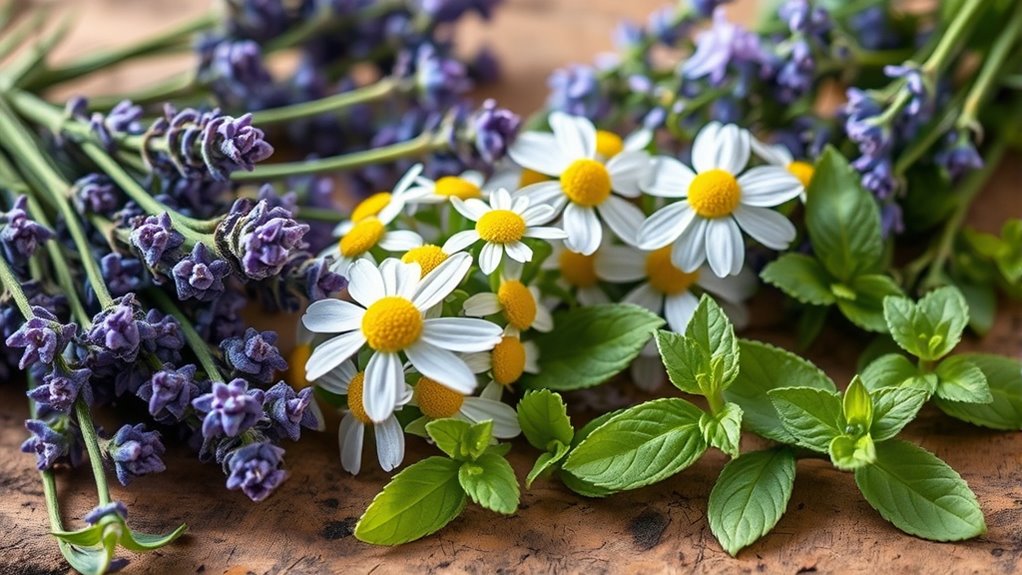Herbal allies like passionflower, ashwagandha, lavender, valerian root, and lemon balm can support your nervous system naturally. Passionflower helps promote calmness and ease anxiety, while ashwagandha boosts your resilience to stress. Lavender’s aroma offers quick relaxation, and valerian root can aid restful sleep. Lemon balm gently calms nerves and reduces anxiety. Combining these herbs thoughtfully can enhance your overall sense of balance and calm—discovering more ways to strengthen your nervous system.
Key Takeaways
- Passionflower promotes calmness and reduces anxiety through effective extraction and cultivation practices.
- Ashwagandha enhances stress resilience by modulating cortisol levels and supporting nervous system recovery.
- Lavender aromatherapy alleviates tension, boosts mood, and promotes emotional balance.
- Valerian root aids sleep and relaxation without drowsiness, helping restore nervous system calm.
- Lemon balm provides gentle anxiety relief, especially when combined with mindfulness techniques.
Passionflower: Nature’s Calm-Inducing Herb
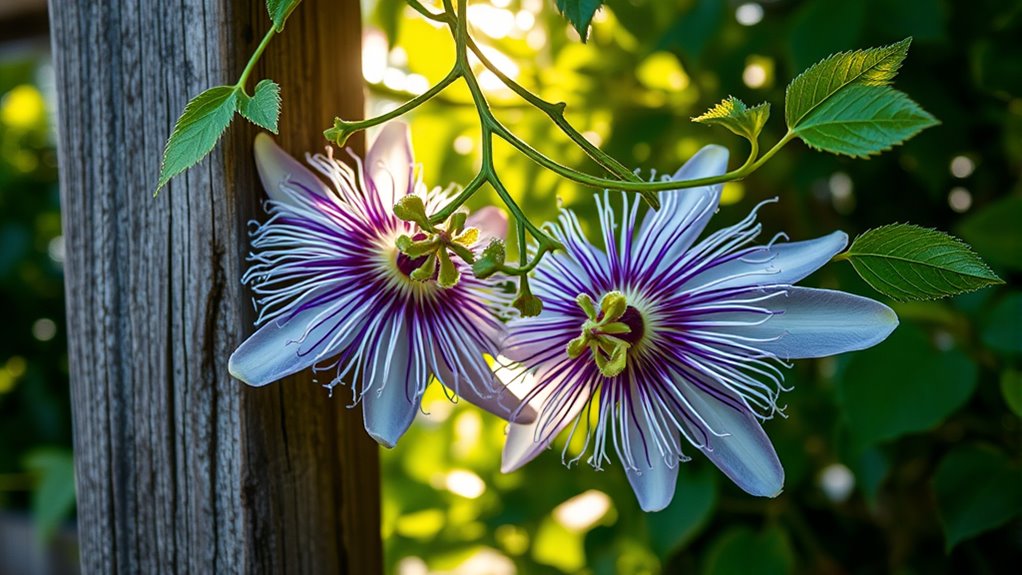
If you’re seeking natural relief from anxiety and restlessness, passionflower is an excellent herb to contemplate. To maximize its calming benefits, understanding herbal extraction methods is essential. Using proper techniques like tincturing or decoction ensures you extract active compounds effectively. When cultivating passionflower, focus on herbal cultivation tips such as choosing well-drained soil, providing ample sunlight, and maintaining consistent watering. This herb thrives in warm environments and benefits from trellises or support structures to encourage healthy growth. Harvest the leaves and flowers at peak maturity for the strongest medicinal properties. Proper harvesting and preparation enhance the herb’s calming effects and preserve its potency. By combining effective extraction methods with attentive cultivation, you can harness passionflower’s natural tranquility for your well-being.
Ashwagandha: Adaptogen for Stress Resilience
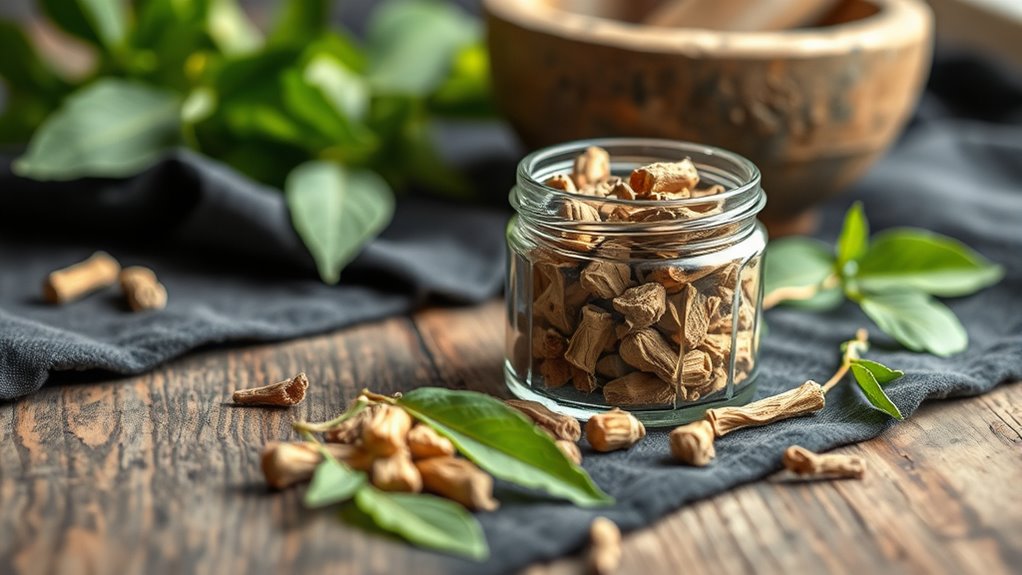
After exploring passionflower’s calming effects, it’s helpful to contemplate adaptogens like ashwagandha that bolster your body’s resilience to stress. As an adaptogen, ashwagandha supports stress adaptation by helping your body manage daily pressures more effectively. It works by modulating your adrenal response, reducing excess cortisol levels, and promoting overall adrenal support. Incorporating ashwagandha into your routine can enhance your ability to handle stress without feeling overwhelmed or exhausted. This herb doesn’t just soothe; it actively strengthens your nervous system’s capacity to recover from stressors. With consistent use, ashwagandha becomes a reliable ally in maintaining balance, fostering resilience, and supporting your mental clarity during challenging times. Signs of stress-related fatigue can also improve as your body becomes better equipped to manage stress.
Lavender: Aromatic Relaxation Support
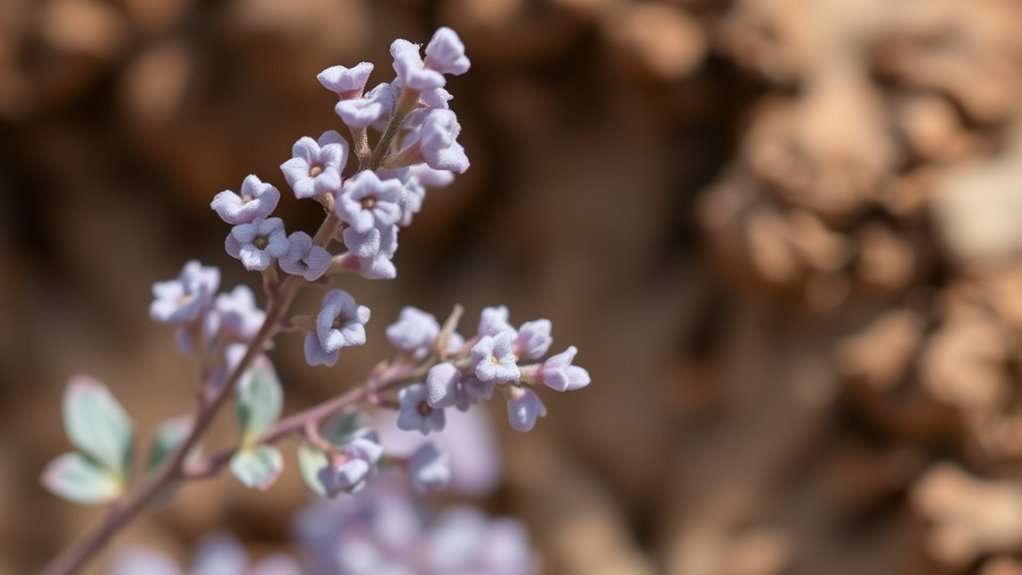
Lavender’s soothing aroma has been cherished for centuries as a natural remedy for relaxation. When you incorporate lavender into your aromatic therapy, it creates a calming environment that eases tension and promotes mental clarity. You can add a few drops of lavender essential oil to a diffuser or apply diluted oil to your wrists or temples to enhance relaxation techniques. The scent works quickly to reduce feelings of stress and anxiety, helping you unwind after a busy day. Lavender’s gentle aroma not only supports emotional balance but also encourages restful breathing. Essential oils for relaxation can enhance your mood and overall well-being. By consciously using lavender aromatherapy, you actively support your nervous system’s resilience, making it easier to manage daily stressors and cultivate a sense of calm. Incorporating lavender into your routine is a simple yet effective way to promote emotional well-being and support your nervous system.
Valerian Root: Traditional Sleep Aid and Calmness
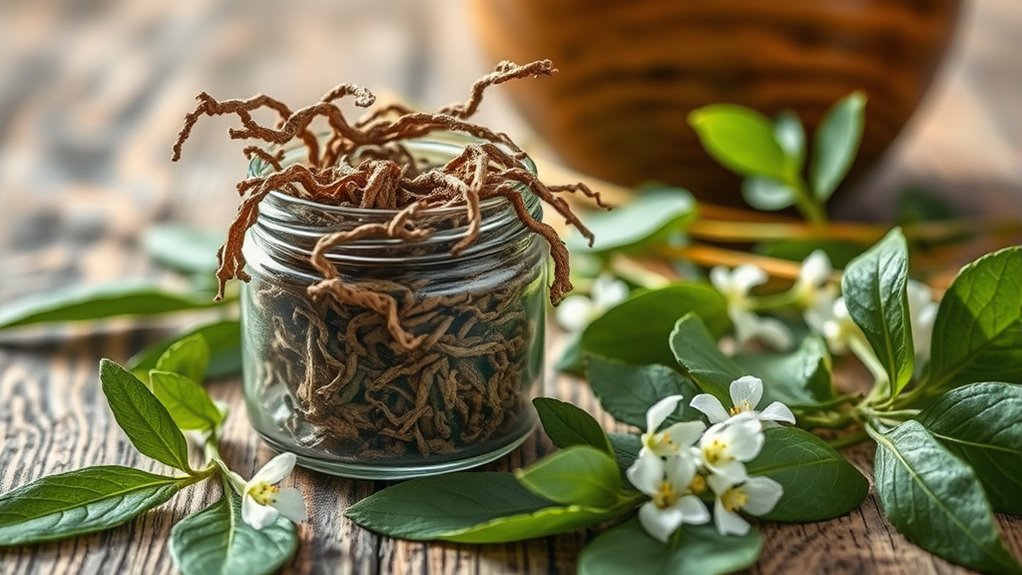
While lavender helps ease mental tension, many also turn to valerian root for its calming properties that promote restful sleep. Valerian has a long history as a natural sleep aid, helping you relax without drowsiness the next day. When using valerian, herbal safety is important—consult a healthcare professional before starting, especially if you’re pregnant or taking medications. Dosage considerations are key; typical doses range from 400 to 900 mg, taken 30 minutes to two hours before bedtime. Some may experience mild side effects like dizziness or stomach upset, but these usually subside. Always follow recommended guidelines to avoid interactions or dependency. With proper use, valerian can be a trusted ally for supporting calmness and better sleep.
Lemon Balm: Gentle Anxiety Relief
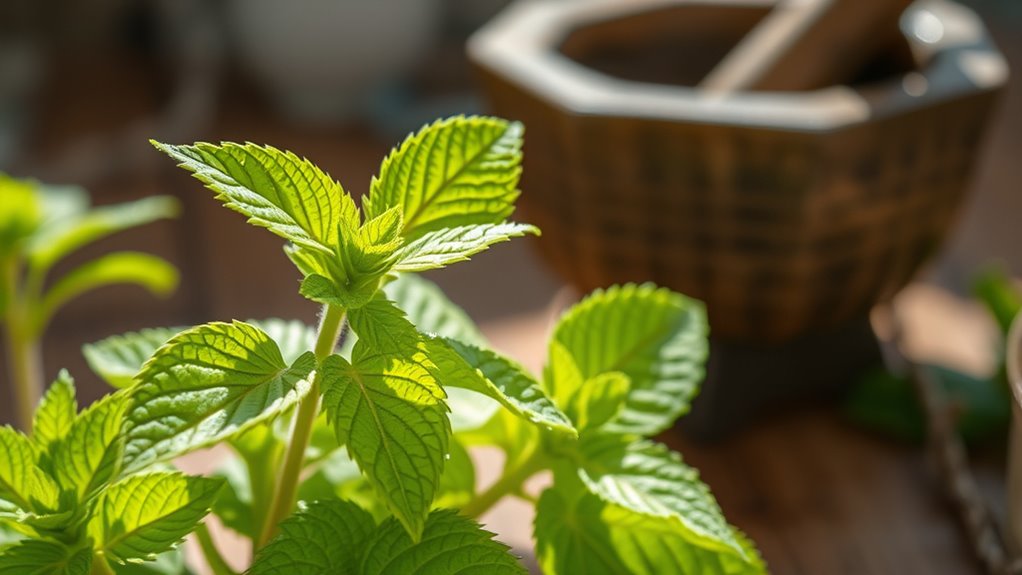
Lemon balm has been valued for centuries as a gentle remedy to ease anxiety and promote relaxation. Its calming effects work well when combined with other herbs, creating herbal synergy that enhances stress management techniques. You can brew lemon balm tea or take it as a supplement to help soothe nerves without sedation. Incorporating lemon balm into your daily routine can support a balanced nervous system, especially during stressful times. It’s a natural way to calm your mind and reduce feelings of unease. Remember, combining lemon balm with practices like deep breathing or mindfulness amplifies its benefits. Additionally, automation technologies are increasingly being used in healthcare to improve treatment efficiency and patient outcomes, highlighting the importance of integrating natural remedies with modern innovations. These advancements facilitate precise monitoring and personalized care, making natural approaches more accessible and effective. By integrating this herb into your toolkit, you’re taking a gentle, effective step toward managing anxiety naturally.
Frequently Asked Questions
Can Herbal Supplements Replace Prescribed Psychiatric Medications?
You might wonder if herbal supplements can replace prescribed psychiatric medications. While some herbs may offer supportive effects, they often act as herbal placebos without the proven efficacy of medications. Instead, consider how herbal allies can work in medication synergy, enhancing overall well-being. Always consult your healthcare provider before making changes, as herbs should complement, not replace, prescribed treatments for mental health conditions.
Are There Any Known Interactions Between These Herbs and Common Medications?
You might notice how everyday herbal remedies seem harmless, but they can have drug interactions or herbal contraindications with your medications. Always check with your healthcare provider before combining herbs with prescription drugs, as some herbs can interfere with medication effectiveness or cause adverse effects. Staying informed helps you avoid unexpected reactions and ensures your treatment remains safe and effective, turning a coincidence into a well-planned health strategy.
How Long Does It Typically Take to Notice Effects From Herbal Nervine Remedies?
The time to see results from herbal nervine remedies varies depending on the individual and the specific herb. Typically, you might notice effects within a week or two, but some may take longer, around four to six weeks. The herbal effectiveness timeline depends on factors like dosage, consistency, and your personal response. Stay patient and consistent, and you’ll likely observe gradual improvements in your nervous system over time.
Are These Herbs Safe for Pregnant or Breastfeeding Women?
You wonder if these herbs are safe during pregnancy or breastfeeding. It’s important to take herbal safety and pregnancy considerations before use. Some nervine herbs may be safe, but many are not recommended during pregnancy or breastfeeding due to potential risks. Always consult your healthcare provider to ensure safety, as individual circumstances vary. Never self-prescribe herbal remedies during these times without professional guidance to protect both you and your baby.
What Are the Best Dosages for Different Age Groups or Conditions?
Think of herbal dosages as a tailored suit—perfectly fitted to your age and condition. For different age groups or specific health needs, follow age-specific dosages and condition-based recommendations to guarantee safety and effectiveness. Young children require smaller doses, while adults may need more robust amounts. Always consult a healthcare professional to fine-tune your herbal regimen, avoiding a one-size-fits-all approach and embracing personalized care.
Conclusion
Just like a whispered lullaby from Mother Nature herself, these herbal allies can gently soothe your nervous system. Think of passionflower as your calming muse, as if calming Hypnos’s restless dreams. Embrace ashwagandha’s resilience, channeling your inner Hercules. Lavender’s aroma can evoke the serenity of a tranquil garden. With valerian and lemon balm, you’ll find a gentle refuge amid life’s chaos. Let these herbs be your modern-day elixirs, helping you find peace amidst the storm.
